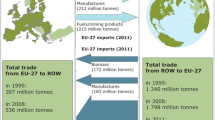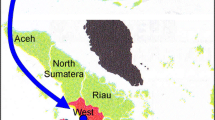Abstract
This research proposes for the introduction of a recycling system in the Gambia to enhance sustainable municipal solid waste management. Poor infrastructures, coupled with inadequate resources and lack of funding, work against the optimization of a MSW disposal service. In the authors’ view, authorities in charge of waste management need to change not only behaviors, but modernize their processes. Recycling technology is a key part of the solution. A model has been developed which suggest the involvement of stakeholders to achieve meaningful sustainable MSWM. This can be achieved by recognizing the role of the informal sector through community-based organizations, Non-Governmental Organizations (NGOs), and the private sector. The open dump approach is leading to severe environmental consequences as the groundwater and soil within the dump is been contaminated. In this study, an integrated municipal solid waste management approach was developed with a model to help achieve sustainable municipal solid waste management. Resource recovery, not waste disposal, must be the ultimate goal with clearly defined end user markets so that the recovery loop is complete. Mandatory sorting of waste at household level would help greatly in making recycling activity successful.




Similar content being viewed by others
References
MoE Japan. (2006). Annual report on the environment in Japan.
Baud, I., & Post, J. (2003). Between markets and partnerships: Urban solid waste management and contributions to sustainable development. Global Built Environment Review, 3(1), 46–65.
Buenrostro, O., & Bocco, G. (2003). Solid waste management in municipalities in Mexico: Goals and perspectives. Resources, Conservation and Recycling, 39(3), 251–263.
Coad. (2006) Solid waste, health and the millennium development goals. Report of the CWG-WASH workshop, Kolkata, India.
Hasan, A., Patel, S., & Satterthwaite, D. (2005). How to meet the millennium development goals (MDGS) in urban areas. Environment & Urbanization, 17(1), 19.
Medina, M. (1997). The effect of income on municipal solid waste generation rates for countries of varying levels of economic development: A model. Journal of Solid Waste Technology and Management, 24(3), 149–155.
Medina, M. (2000). Scavenger co-operatives in Asia and Latin America. Resources, Conservation and Recycling, 31, 51–69.
Medina, M. (2004). Scavenger cooperatives in Asia and Latin America. Global Development Network. http://www.gdnet.org/pdf/medina.pdf. Retrieved 12 Oct 2004.
Medina, M. (2006). Achieving the MDGs through the informal recycling sector: A case study in Northern Mexico. Paper delivered at the CWG-WASH workshop.
Nzainga, J. M. (2002). Preliminary and detailed engineering design study for bakoteh dump site. The Gambia agency for the management of public works.
Rossel, S. A., & Jorge, M. F. (1999). Cuban strategy for management and control of waste. In A. Barrage, X. Edelmann (Eds.), Recovery, recycling, re-integration (R ‘99) congress proceedings, Vol. 1 (pp. 287–290). Switzerland: EMPA.
Troschinetz, A. M., & Mihelcic, J. R. (2009). Sustainable recycling of municipal solid waste in developing countries. Waste Management, 29, 915–923.
UN (2006). World urbanization prospects—the 2005 revision. New York: United Nation Population Division, Department of Economic and Social Affairs.
UNDESA (2005). Agenda 21—chapter 21 environmentally sound management of solid wastes and sewage-related issues. Division for Sustainable Development, United Nations Department of Economic and Social Affairs. http://ww.un.org/esa/sustdev/documents/agenda21/index.htm.
UNEP (2001a). Solid waste management, Chap. 3. Nepal: State of the Environment 2001, United Nations Environment Programme, pp. 97–118.
UNEP (2001b). Waste disposal, Chap. 3.2. Sri Lanka: State of the Environment 2001, United Nations Environment Programme, pp. 42–52.
UNEP (2002). Key environmental issues: Management of solid waste and sewage, Chap. 3.3. Maldives: state of the Environment 2002, United Nations Environment Programme, pp. 41–44.
UNEP (2003). Global Environment Outlook 3. London: Earthscan Publications.
Wang, H., & Nie, Y. (2001). Municipal solid waste characteristics and management in China. Journal of Air and Waste Management Association, 51, 250–263.
Whiteman, A., Smith, P., & Wilson, D. C. (2001). Whiteman, A., Smith, P, & Wilson, D. C. Waste management: An indicator of urban governance. Paper prepared for the UK DFID submitted for the Global Habitat conference on Urban Development, June 2001, New York.
Wilson, D. C. (2007). Development drivers for waste management. Waste Management& Research, 25, 198–207.
Wilson, D. C., Velis, C., & Cheeseman, C. (2006). Role of informal sector recycling in waste management in developing countries. Habitat International, 30(4), 97–808.
World Bank (2001). Philippines environment monitor 2001 (p. 29). Manila, Pasig City, Philippines: World Bank—Country Office.
World Bank (2003). Indonesia environment monitor 2003 (pp. 33–41). Jakarta, Indonesia: World Bank Indonesia Office.
Acknowledgments
The author would like to thank the National Environmental Agency of the Gambia for their collaboration. Most specially would also like to thank the government of the Gambia for giving him the opportunity to pursue his studies.
Author information
Authors and Affiliations
Corresponding author
Additional information
Readers should send their comments on this paper to BhaskarNath@aol.com within 3 months of publication of this issue.
Rights and permissions
About this article
Cite this article
Sanneh, E.S., Hu, A.H., Chang, Y.M. et al. Introduction of a recycling system for sustainable municipal solid waste management: a case study on the greater Banjul area of the Gambia. Environ Dev Sustain 13, 1065–1080 (2011). https://doi.org/10.1007/s10668-011-9305-9
Received:
Accepted:
Published:
Issue Date:
DOI: https://doi.org/10.1007/s10668-011-9305-9




